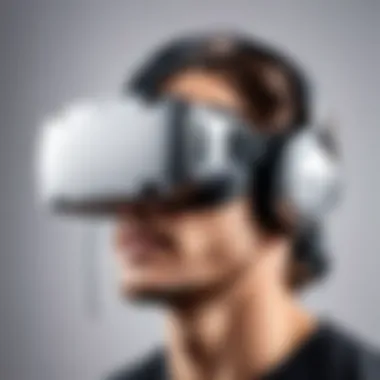Embarking on a Journey Through PC-Free VR Innovations


Product Overview
The realm of PC-Free VR systems stands at the forefront of technological innovation, offering users a liberating experience in virtual reality without the tethering constraints of a computer. These systems provide an immersive journey into digital realms, captivating tech enthusiasts, gamers, and IT professionals alike. The absence of a PC elevates user comfort and mobility, making VR more accessible and user-friendly.
Brand Information: Leading brands in the PC-free VR system domain include Oculus Quest, HTC Vive Focus, and PlayStation VR. Each brand boasts unique features and design elements that cater to diverse preferences and requirements.
Key Specifications: Specifications vary across brands but generally encompass high-resolution displays, ergonomic controllers, intuitive interfaces, and robust tracking systems for fluid immersion.
Pricing: While prices may vary, PC-free VR systems typically range between $300 to $800, offering varying levels of performance and features corresponding to their price points.
Performance Comparison
Within the competitive landscape of PC-free VR systems, benchmark tests play a pivotal role in evaluating performance metrics. Speed and efficiency comparisons shed light on the responsiveness and fluidity of VR experiences, helping users make informed decisions based on their preferences.
Features and Technology
Unique Features: PC-free VR systems integrate cutting-edge features such as inside-out tracking, wireless capabilities, and integrated audio solutions, enhancing user convenience and overall immersion. Each system offers a distinct set of features that appeal to different user demographics.
Technological Advancements: Advancements in display technologies, refresh rates, and motion tracking have significantly augmented the realism and interactivity of PC-free VR systems. These technological strides contribute to a more seamless and captivating virtual experience.
Compatibility with Other Devices: Some PC-free VR systems offer compatibility with external devices like smartphones, PCs, or gaming consoles, expanding the versatility and utility of the VR ecosystem. Such compatibility fosters a more integrated digital landscape for users.
Pros and Cons
Strengths of the Product
- Enhanced mobility and portability
- Intuitive user interfaces
- Diverse content libraries
Areas for Improvement
- Battery life limitations
- Processing power constraints
- Limited graphical fidelity compared to PC-dependent VR systems
Value for Money
When assessing the value proposition of PC-free VR systems, several factors come into play. Cost-effectiveness, long-term benefits, and comparison with similar products form the basis for determining the optimal investment in VR technology. Understanding the long-term advantages and cost efficiency of these systems is crucial for users seeking an immersive and sustainable virtual reality experience.
Prolusion to PC-Free VR Systems
Virtual Reality (VR) enthusiasts and tech-savvy individuals constantly seek innovative ways to immerse themselves in virtual worlds without the confines of a PC. The concept of PC-Free VR Systems revolutionizes the way users interact with virtual environments by eliminating the need for a traditional computer setup. This article delves deep into the realm of PC-Free VR Systems, exploring the technology that empowers users to experience immersive VR without the tether of a PC. From unravelling the foundational aspects to deciphering the advantages and drawbacks, this comprehensive guide aims to enlighten readers on the dynamic landscape of PC-Free VR Systems.
Understanding the Basics
Definition of PC-Free VR
Heralding a new era in VR experiences, the Definition of PC-Free VR encapsulates the essence of freedom and mobility for users. By eradicating the necessity for a connected computer, this approach allows individuals to delve into virtual realms unbounded by physical constraints. The key characteristic of this definition lies in its independence from PC peripherals, enabling standalone operation of VR devices. Embracing this tech marvel opens avenues for unparalleled flexibility and accessibility within the VR domain.
Evolution of VR Technology
The Evolution of VR Technology signifies the progressive journey from cumbersome wired setups to streamlined, PC-Free solutions. A pivotal shift towards more user-friendly and versatile VR systems characterizes this evolution. The core principle driving this advancement is to enhance user experience through seamless integration and improved functionalities. By tracing the evolution of VR tech, one can witness the fusion of innovation and user-centric design, shaping the landscape of modern VR experiences.


Advantages of PC-Free VR
Portability and Convenience
Stemming from the essence of mobility, Portability and Convenience redefine how users engage with VR content. The key characteristic here lies in the ability to transport VR experiences effortlessly, unrestricted by stationary PCs. This innate portability fosters a dynamic VR ecosystem where users can enjoy immersive content anytime, anywhere. The seamless integration of mobility and convenience elevates the overall appeal of PC-Free VR systems.
Easy Setup and Accessibility
Ease of Setup and Accessibility plays a pivotal role in widening the accessibility of VR technology to a broader audience. The key characteristic revolves around the simplicity of initiating VR experiences without the complexities of conventional PC setups. This streamlined approach enhances user engagement by removing barriers to entry, thereby fostering inclusivity in the VR community.
Limitations and Challenges
Processing Power Constraints
Addressing Processing Power Constraints is crucial in optimizing the efficiency of PC-Free VR systems. The key characteristic involves balancing performance requirements with the constraints of mobile hardware. Navigating this fine line ensures a seamless VR experience without compromising on visual quality or responsiveness. Overcoming processing limitations challenges developers to innovate and optimize system performance for optimal user engagement.
Storage Limitations
While Storage Limitations persist as a challenge, mitigating strategies are vital to maintaining a seamless VR experience. The key characteristic revolves around efficient data management and storage allocation within limited hardware capabilities. Implementing smart storage solutions enhances user experience by ensuring quick access to content while minimizing latency issues. Adapting to storage limitations prompts developers to explore creative solutions for data optimization in PC-Free VR environments.
Key Features of PC-Free VR Systems
PC-Free VR systems represent a groundbreaking advancement in technology, liberating users from the traditional tether of a computer. These systems boast a multitude of key features that enhance the virtual reality experience to uncharted levels. From wireless connectivity to integrated sensors and state-of-the-art display resolution, each element plays a crucial role in delivering immersive virtual worlds.
Wireless Connectivity
Bluetooth and Wi-Fi Integration
Bluetooth and Wi-Fi integration serve as the backbone of seamless connectivity in PC-Free VR systems. The marriage of these technologies ensures a smooth and uninterrupted data transfer, essential for the fluid operation of virtual reality applications. With Bluetooth enabling peripheral device connections and Wi-Fi facilitating internet access, users can experience VR without any wired limitations.
Compatibility with Mobile Devices
Mobile device compatibility expands the horizons of PC-Free VR, allowing users to harness the power of their smartphones or tablets for an enriched experience. This connectivity option not only enhances convenience but also leverages the existing technology investments of users. The ability to integrate mobile devices opens up a vast array of content and applications tailored for VR immersion.
Built-In Sensors and Tracking Technology
Inside-Out Tracking
Inside-out tracking revolutionizes the VR landscape by eliminating the need for external sensors. This onboard technology utilizes cameras and sensors within the headset to track movement accurately in physical space. By offering a more portable and user-friendly tracking solution, inside-out tracking enhances the freedom of movement in virtual environments.
Motion Sensors
Motion sensors in PC-Free VR systems detect even the subtlest movements, translating them into immersive virtual experiences. These sensors capture gestures and interactions with exceptional precision, fostering a heightened sense of presence within virtual worlds. The integration of advanced motion tracking technology sets the stage for unprecedented interactivity in VR applications.
Display and Resolution
Optimal Visual Experience
The quest for an optimal visual experience culminates in high-resolution displays that transport users to realms of unparalleled clarity. PC-Free VR systems prioritize visual fidelity, minimizing lag and enhancing image quality for a truly lifelike encounter. With vivid colors and sharp details, users can explore virtual environments with breathtaking realism.


Screen Door Effect Mitigation
Screen door effect mitigation addresses a common challenge in VR displays, where visible gaps between pixels disrupt the immersive experience. By employing specialized techniques and technologies, PC-Free VR systems reduce or eliminate this visual artifact, ensuring a seamless and undisturbed virtual reality journey.
Popular PC-Free VR Systems in the Market
Exploring the diverse landscape of PC-free VR systems in the current market is crucial for tech enthusiasts and gamers alike. These systems offer a remarkable level of immersion without the tether of a PC, revolutionizing the virtual reality experience. From Oculus Quest to HTC Vive Focus and PlayStation VR, the market boasts a range of options catering to different preferences and needs.
Oculus Quest Series
Hardware Specifications
Delving into the hardware specifications of the Oculus Quest series unveils a sophisticated blend of components designed to deliver an unparalleled VR experience. The high-resolution display, powerful processor, and intuitive controllers are meticulously crafted to transport users into virtual realms seamlessly. The wireless freedom coupled with robust performance makes the Oculus Quest series a standout choice for individuals seeking top-tier VR hardware.
Gaming Library and Content
The gaming library and content offerings of the Oculus Quest series are a testament to its excellence in the VR domain. Boasting a diverse range of titles and experiences, this series caters to both casual gamers and VR enthusiasts. The exclusive content coupled with regular updates ensures a fresh and engaging experience, solidifying the Oculus Quest's position as a frontrunner in the PC-free VR market.
HTC Vive Focus Series
Features and Functionality
The HTC Vive Focus series stands out for its feature-rich design and unparalleled functionality. From advanced tracking technology to intuitive interface, this series prioritizes user experience at every turn. The ergonomic design coupled with seamless integration elevates the VR experience, making the HTC Vive Focus series a preferred choice for those seeking innovation and performance.
Business and Enterprise Applications
Beyond gaming, the HTC Vive Focus series shines in business and enterprise applications. Its compatibility with professional software, ease of use, and durability make it a go-to option for industries seeking VR solutions. From virtual meetings to training simulations, the HTC Vive Focus series empowers businesses to leverage VR technology for enhanced productivity and engagement.
PlayStation VR
Console Compatibility
PlayStation VR's seamless integration with the PlayStation console ecosystem sets it apart as a convenient and accessible VR option. The compatibility with existing PlayStation hardware ensures a hassle-free setup, catering to console gamers looking to expand their gaming horizons. With smooth connectivity and optimized performance, PlayStation VR offers a straightforward yet immersive VR experience.
Exclusive VR Titles
A noteworthy aspect of PlayStation VR is its collection of exclusive VR titles, offering a unique and captivating gaming experience. From iconic franchises to innovative indie titles, PlayStation VR's exclusive lineup presents a diverse range of gaming adventures. The access to exclusive content elevates the VR experience on PlayStation, establishing it as a must-have for gamers seeking exclusive and compelling VR titles.
Applications and Use Cases of PC-Free VR Systems
This section delves deep into the diverse applications and essential use cases of PC-free VR systems. As the technology continues to advance rapidly, its practical implications across various industries are becoming more prominent. Enthusiasts and professionals alike are recognizing the versatility and effectiveness of utilizing VR without being tethered to a computer.
Gaming and Entertainment
Immersive Gaming Experiences
Immersive gaming experiences are at the forefront of the VR revolution. They provide users with a sense of unparalleled realism and interaction, enhancing gameplay to a whole new level. The deep immersion offered by VR technology is a game-changer, enabling gamers to feel fully engaged in virtual worlds and enhancing their gaming experience dramatically.
360-Degree Videos and VR Movies
The realm of 360-degree videos and VR movies opens up cinematic possibilities like never before. Users can now immerse themselves in movies and videos, experiencing scenes from all angles with a sense of presence that traditional media cannot match. This form of content consumption reinvents storytelling, pushing boundaries of narrative and engaging viewers in a truly unique manner.
Training and Simulation
Virtual Training Environments
Virtual training environments are revolutionizing instructional techniques across various fields. From corporate training to educational simulations, VR offers a hands-on, practical approach to learning that enhances retention and engagement. The ability to create dynamic, interactive scenarios makes virtual training environments a valuable tool for skill development and knowledge retention.
Medical and Healthcare Simulations
In the medical and healthcare sectors, VR simulations play a crucial role in training professionals and enhancing patient care. Simulated medical scenarios provide a safe space for practitioners to hone their skills, practice complex procedures, and enhance decision-making abilities. Moreover, VR simulations improve patient outcomes by ensuring healthcare providers are well-prepared for diverse cases.
Educational and Productivity
Virtual Classrooms
Virtual classrooms are reshaping the landscape of education by offering immersive learning experiences. Students can engage with course material in a dynamic, interactive setting, enhancing their understanding and retention of information. The collaborative nature of virtual classrooms fosters a sense of community and encourages active participation, revolutionizing traditional teaching methods.
Design and Collaboration Tools
Design and collaboration tools empower professionals to work together seamlessly in virtual spaces. Architects, engineers, and designers can visualize projects in 3D, collaborate in real-time, and make decisions efficiently. By facilitating remote collaboration and enabling better visualization of concepts, these tools enhance productivity and streamline workflow processes.
Future Trends and Developments
The landscape of PC-Free VR systems is poised for a significant transformation as technology continues to evolve at a rapid pace. This section highlights the pivotal role that future trends and developments play in shaping the next generation of virtual reality experiences. As tech enthusiasts and gamers look towards the horizon, several key elements emerge as critical considerations. Enhanced Hardware Capabilities, Integration with AI and IoT, and Expansion of Content Libraries are at the forefront of innovation, promising to redefine the VR landscape in the coming years.
Enhanced Hardware Capabilities
Improved Processing Power
The realm of PC-Free VR systems hinges on the backbone of improved processing power, a cornerstone for delivering seamless and immersive experiences. The relentless pursuit of enhanced processing capabilities underscores the commitment towards elevating user interactions within virtual environments. With a focus on reducing latency and enhancing graphical fidelity, improved processing power stands as a testament to the ever-evolving nature of VR technology.
Higher Resolution Displays
In parallel, the integration of higher resolution displays marks a paradigm shift in visual quality and clarity. By embracing sharper images and vibrant colors, higher resolution displays pave the way for a more lifelike and engaging virtual realm. The pursuit of finer details and enhanced immersion through higher resolutions is a definitive step towards bridging the gap between virtual and physical realities.
Integration with AI and IoT
Smart Home Applications
The convergence of VR systems with smart home applications presents a realm of possibilities for enhanced user experiences. By seamlessly integrating VR technology with IoT devices, users can delve into immersive environments that respond dynamically to real-world inputs. Whether controlling home settings within a VR interface or experiencing automated adjustments based on their virtual interactions, smart home applications offer a glimpse into the future of interconnected living spaces.
AI-Driven VR Experiences
Furthermore, the infusion of Artificial Intelligence into VR experiences opens new avenues for personalized and context-aware interactions. AI-driven VR experiences leverage machine learning algorithms to adapt to user preferences, crafting tailored environments that cater to individual needs. From intelligent NPCs in gaming scenarios to predictive analytics enhancing training modules, AI-driven VR experiences herald a new era of adaptive and responsive virtual content.
Expansion of Content Libraries
Diverse Gaming Titles
The expansion of content libraries ushers in a diverse array of gaming titles catering to varied preferences and tastes. With a rich tapestry of genres and gameplay experiences, users can explore worlds teeming with creativity and engagement. The proliferation of diverse gaming titles not only broadens entertainment options but also fosters innovation and creativity within the gaming industry.
Educational and Training Modules
On the educational front, the integration of VR technology in training modules redefines traditional learning paradigms. By offering immersive environments for skill development and knowledge acquisition, educational and training modules empower learners with interactive and experiential tools. From virtual simulations in medical training to hands-on scenarios in technical fields, VR stands as a catalyst for revolutionizing educational methodologies.







